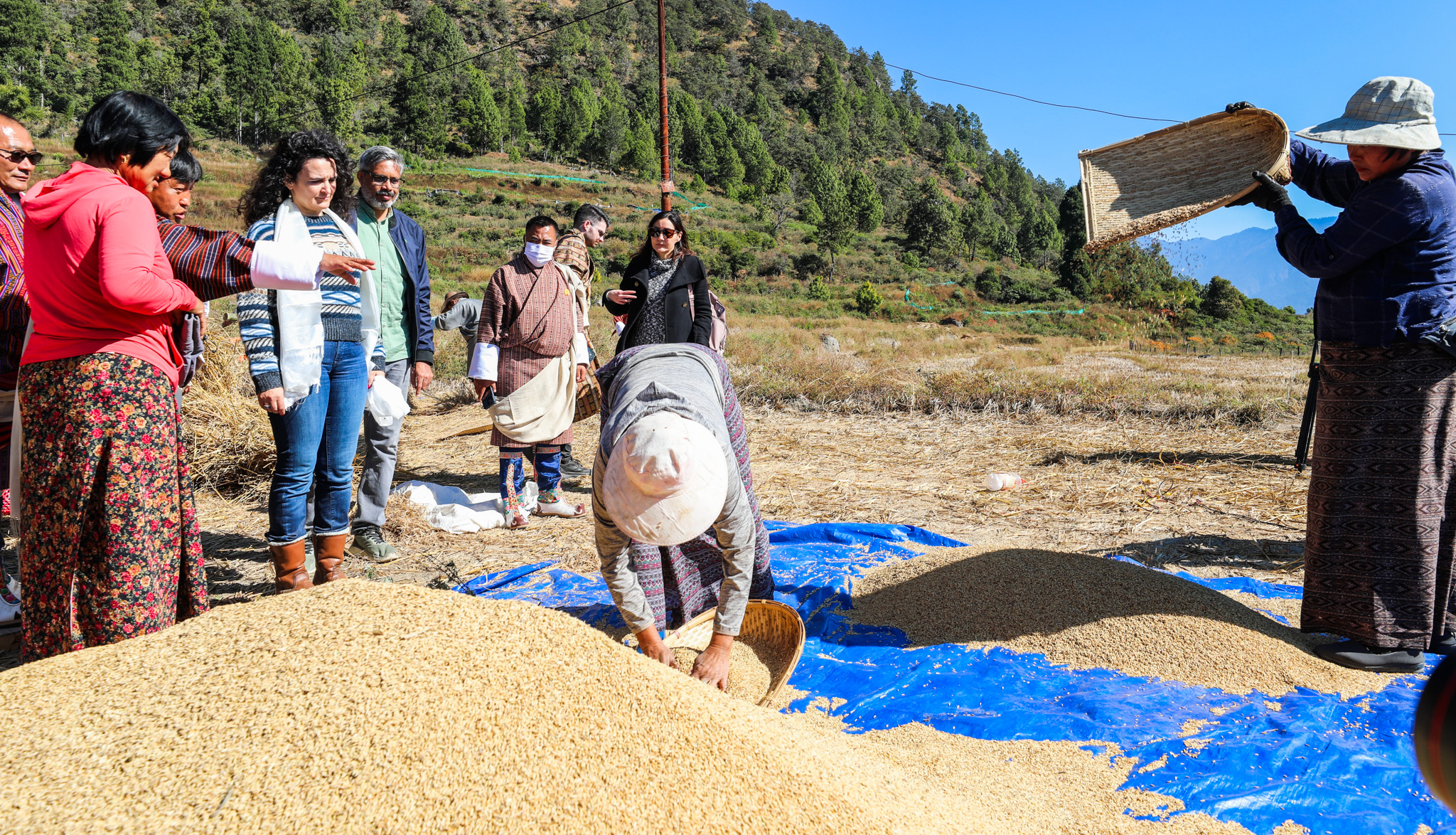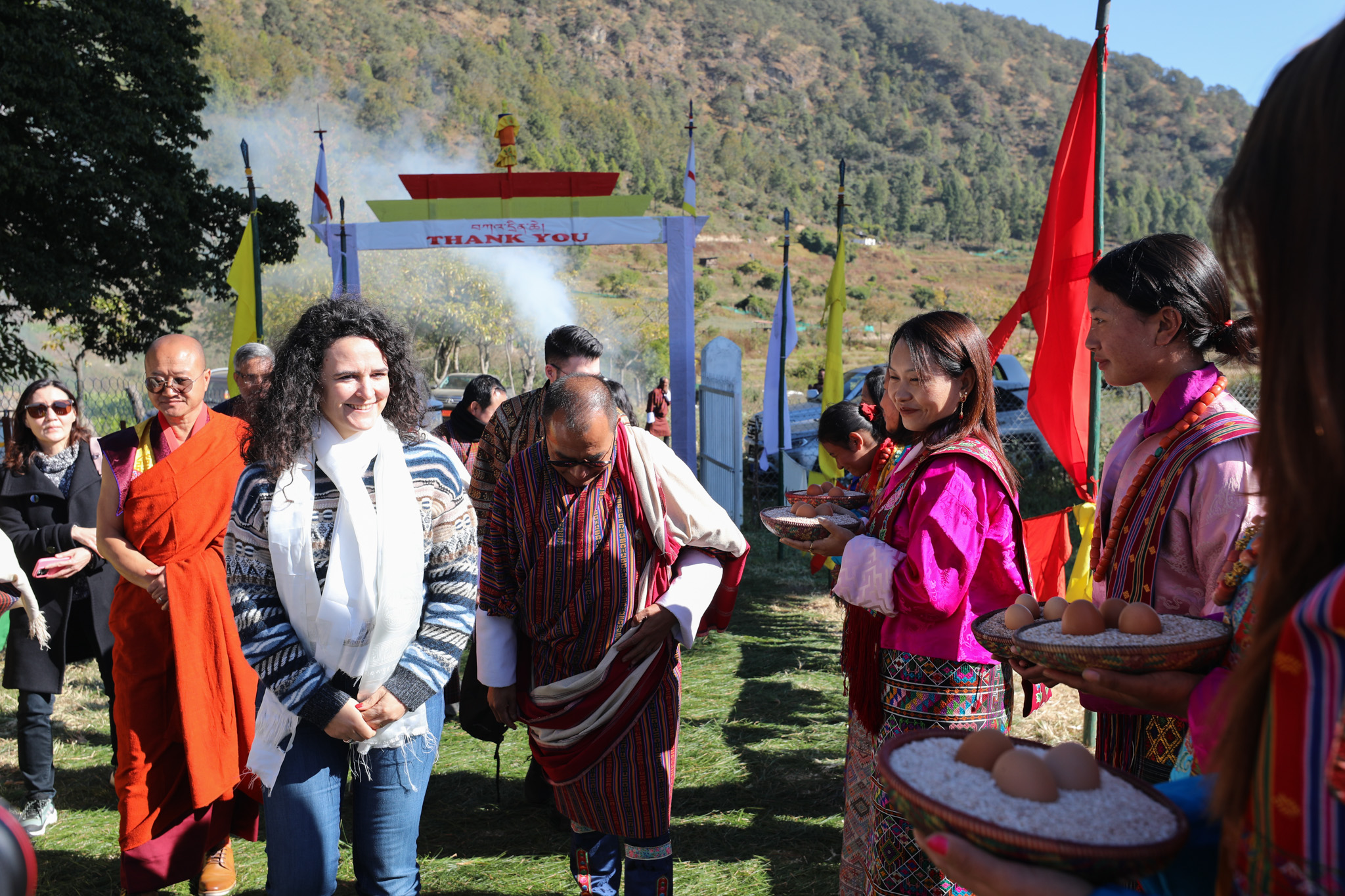Mafalda Duarte, Executive Director of the Green Climate Fund (GCF), who visited Phangyul in Wangdue Phodrang district on Tuesday, 3rd December witnessed first-hand the impact of an irrigation scheme, installed by the government in partnership with the GCF and UNDP, that ended the community’s decades-long water scarcity.
Witnessing a sea of change in Phangyul
December 5, 2024

Mafalda Duarte, GFC's Executive Director interacts with farmers in Phangyul
Sumcho Pem, 45, from Phangyul Goenpa was all smiles as she took Mafalda Duarte, Executive Director of GCF to her paddy fields where she was threshing her rice harvest. It is Sumcho Pem’s first rice harvest in about five decades. “It is wonderful to be able to grow rice again,” Sumcho said.

Sumcho Pem poses with GCF's Executive Director Mafalda Duarte
88-year-old Gyem beamed with joy as she welcomed Mafalda to her home and showed her rice harvest. “It’s a dream-come true,” said Gyem who endured water scarcity all her life and prayed for a respite every day.

GCF's Executive Director Maflada Duarte at Gyem's home

Mafalda shares a light moment with Gyem
Acute water shortage that has plagued Phangyul for decades had forced Sumcho Pem and others in the community to forgo paddy cultivation. A new 38-kilometer piped irrigation scheme (27 kilometers for Phangyul gewog and 11 kilometers for Kazhi gewog) installed by the Royal Government of Bhutan with support from UNDP and GCF, has finally put Phangyul’s water woes to an end once and for all.
Inaugurated in June this year, the irrigation scheme installed at a cost of Nu. 550.99 million (US$6 million) heralded a new chapter for the people of Phangyul as it breathed life into parched farmlands that had long been abandoned and restored their lost livelihoods. The irrigation scheme helped restore 1,241 acres of fallow land belonging to 285 households and 2,485 people.

Phangyul community welcomes GCF's Executive Director Mafalda Duarte
“I am thrilled to be in Phangyul and see firsthand the impact of our partnership with the Royal Government of Bhutan and UNDP,” said Mafalda Duarte. “What I have witnessed here is how much the water supply provided through the irrigation scheme has impacted the community. Farmers are now able to grow rice and vegetables and sell in the market. It’s transformational. It’s a sea of change- from not having enough for household consumption to a situation where they now produce in excess and sell for income.”

Phangyul farmers ploughed their paddy fields in June for the first time in decades
“My vision as well as one of the priorities of the GCF is to support the most vulnerable. In this community, we are not only impacting their food security and nutrition but also education and bringing new prosperity and hope for a better future. This is what it means to reach the most vulnerable people and communities,” said the head of GCF.
The Phangyul irrigation scheme is one of the 36 such schemes spread across eight districts and the largest supported through Bhutan’s “Supporting Climate Resilience and Transformational Change in the Agriculture Sector in Bhutan” project implemented with technical support from UNDP and co-financed by the Royal Government of Bhutan and GCF.
The project is supporting Bhutan in its efforts to promote climate-smart agriculture practices and technologies to build resilience of small holder farmers to the growing impacts of climate change. For instance, the irrigation schemes supported through the project, including the one in Phangyul and Kazhi, are all designed to better withstand extreme weather conditions.

“We will not be able to able to respond to climate change if we do not empower developing countries with the means to cope with its impact. When you are in a community like this, you ask what have these communities done to deserve what is coming upon them because of climate change. They did nothing and we know there are many of them who knew about the problem for a long time but did not act. Therefore, it is necessary that we make the citizens of the more affluent countries understand that investments like this abroad are domestic investments because we are in this together and we either solve it together or we stand to lose,” said Mafalda Duarte.
For more information, please contact:
Ms. Dechen Wangmo, Communications and Partnerships Analyst, UNDP | Email: dechen.wangmo@undp.org

 Locations
Locations

